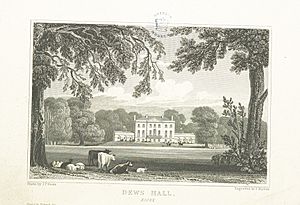Richard Lockwood (politician) facts for kids
Richard Lockwood (born around 1676, died 1756) was an important British merchant and politician. He lived at Dews Hall in Essex, England. He was a Member of Parliament (MP) in the British House of Commons for many years between 1713 and 1741.
Contents
Early Life and Family
Richard Lockwood was the only son of Richard Lockwood and Susanna Cutts. He was probably educated at Westminster School in 1684. He became a very successful merchant, especially in trade with countries in the Middle East, like Turkey. He took over his father's business around 1697. In 1711, he became an Assistant in the Levant Company, which was a trading company. He also received a special role as a Gentleman of the Privy Chamber, which meant he served the King. By 1713, he had married Matilda Vernon.
Becoming a Member of Parliament
In 1713, Richard Lockwood was elected as a Member of Parliament (MP) for a place called Hindon. An MP is someone elected by people to represent them in the House of Commons, where laws are made. Even though he was new to the area, he teamed up with another politician, Reynolds Calthorpe. Lockwood was considered a Whig, which was one of the main political groups at the time, but he might have secretly supported the Tories, another political group. While in Parliament, he continued his work as an Assistant for the Levant Company from 1713 to 1715.
Challenges and New Roles
In 1715, Lockwood lost his seat in Parliament for Hindon. He also tried to become an MP for Worcester but was not successful. When he was not in Parliament, he took on other important business roles. In 1720, he became a Director of the Royal Exchange Assurance Corporation, which was an insurance company. He also worked as an Assistant for the Royal African Company from 1720 to 1725.
Returning to Parliament
In 1722, Richard Lockwood was elected as an MP again, this time for the City of London. He was very popular there. People thought he might have supported the Jacobites, who wanted a different king for Britain. In 1725, the City of London thanked him for his hard work in opposing a new law about city elections. He became a Director of the Royal African Company in 1726. However, he lost his London seat in the 1727 election. In 1732, he became the Deputy Governor of the Royal Exchange Assurance Corporation.
Later Political Career and Retirement
Lockwood was elected as an MP for Worcester in 1734. He continued to be a Tory in Parliament. In 1735, he bought a large estate called Dews Hall in Essex. He spoke about important laws, like a bill about gin in 1736. He also voted against the government on some key issues, such as a treaty with Spain in 1739 and a bill about government jobs in 1740. He also opposed a law about fraud in marine insurance in 1740.
Richard Lockwood decided not to run for re-election in 1741 and retired from politics. He spent his retirement at Dews Hall, where he made the old brick building much bigger and gave it a new, grander look.
Death
Richard Lockwood passed away on August 30, 1756, when he was 80 years old. His home, Dews Hall, was passed down to his oldest son, also named Richard.
 | Misty Copeland |
 | Raven Wilkinson |
 | Debra Austin |
 | Aesha Ash |


